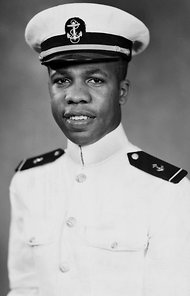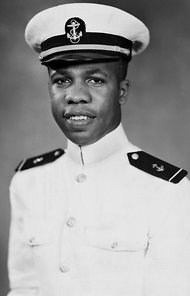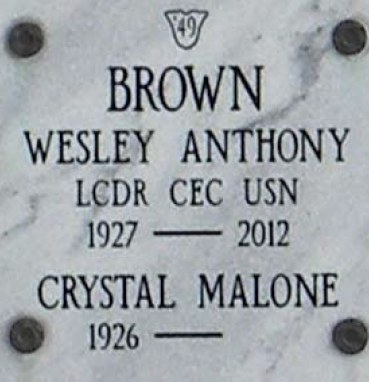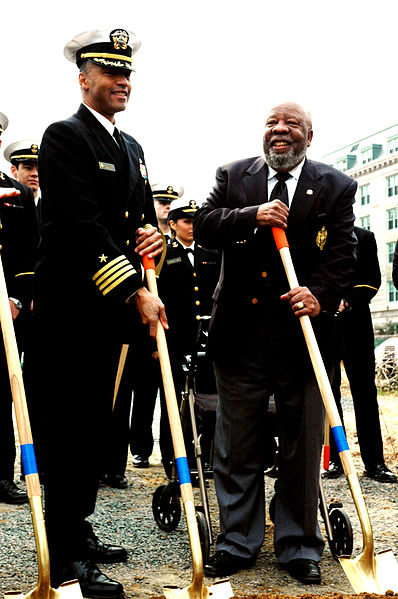Wesley Anthony Brown was born in Baltimore, MD, and grew up in Washington, DC. His father drove a delivery truck and his mother worked at a dry cleaner. Brown graduated from Dunbar High School in Washington, DC, where he was Cadet Corps Battalion Commander during his senior year. He became the first in his family to attend college when he enrolled at Howard University.
Brown was appointed to the U.S. Naval Academy by New York Congressman Adam Clayton Powell, Jr. He entered the Academy on 30 June 1945 and graduated on 3 June 1949, ranking 370th out of nearly 800 graduates. Although he was the sixth black student admitted to the Academy, he was the first to graduate.
At the Academy, Brown studied engineering and ran varsity track and cross-country. One of his cross-country teammates was Jimmy Carter, the 39th president, who was also a graduate of the Academy. In a 1995 interview by The Baltimore Sun, the reporter noted a framed 1989 letter from Carter, his fellow track team member, who would stop by to talk to him and encouraged him to "hang in there." "I ran with you (you were better). Jimmy Carter," the letter read.
The experiences of the first five African Americans admitted to the Academy, and the challenges that Brown and they faced, are documented in the book "Breaking the Color Barrier: The US Naval Academy's First Black Midshipmen and the Struggle for Racial Equality," written by Navy historian Robert J. Schneller Jr. The author said in a 2005 interview that upperclassmen gave Brown excessive demerits for allegedly not maintaining his uniform properly and some classmates would not sit next to him in the cafeteria.
Brown said in a 2005 interview with the Annapolis Capital newspaper, that he spent his four years at the Academy without a roommate, by choice. He said he didn't want to feel responsible for unwilling, or friendly, white midshipmen.
In a 2005 interview with The Baltimore Sun, he said that he learned to not be frustrated when faced with a situation that couldn't be changed. "When I came to the Academy, I learned that there were all kinds of prejudices - against Jews, Catholics, even the Irish - and I looked around and thought that these prejudices were instilled in them by their families and they could not be blamed for feeling the way they did," he said.
Brown served in the U.S. Navy until 30 June 1969 and served in the Korean and Vietnam Wars. He served in the Navy's Civil Engineer Corps, where he was responsible for building: military service member homes in Hawaii; roads in Liberia; wharves in the Philippines; a nuclear power plant in Antarctica; and a desalination plant in Guantanamo Bay, Cuba. Brown retired at the rank of Lieutenant Commander. His medals included the American Theater Ribbon and World War II Victory Medal.
After retiring from the Navy, Brown was a construction project manager for the state of New York and joined the faculty at Howard University as a Physical Facilities Analyst. He retired from civilian employment at Howard University in 1988. He also served as Chairman of the Service Academy Selection Board of DC Congressional Representative Eleanor Holmes Norton.
Brown was a volunteer motivational speaker and especially enjoyed talking with DC high school students and midshipmen of the USNA Black Studies Club during Black History Month.
Honors
In 2009, he was the First Honoree of the National Society of Black Engineers Golden Torch Legacy Award.
On the campus of the U.S. Naval Academy is the Wesley Brown Field House, built to house physical education classes, as well as the Academy's athletic programs.
Ground was broken for the new field house in a ceremony at the Academy on 25 March 2006 and Brown wielded a shovel in the groundbreaking. The building was completed in March 2008 and was dedicated on 10 May 2008. Brown participated in the ribbon-cutting ceremony with Chairman of the Joint Chiefs of Staff Admiral Mike Mullen; Naval Academy Superintendent Vice Admiral Jeffrey L. Fowler; and Maryland Governor Martin O'Malley. Almost one thousand guests were also present.
"I believe this is symbolic," Brown told The Baltimore Sun that year. "Some of the Navy policies, procedures in the past, have not been the kind that African-Americans were in favor of. And I think this indicates their dedication to diversity in general."
Lieutenant Commander Wesley Anthony Brown, Class of 1949, CEC, USN (Ret.) died of cancer on 22 May 2012 at Springhouse of Silver Spring Assisted Living in Silver Spring, MD.
Vice Admiral Michael H. Miller, Superintendent of the Naval Academy, said this in a statement: "Brown embodied the highest ideals of the Academy's mission and dedicated himself to decades of selfless and distinguished service to our nation." "LCDR Brown will be remembered for his enthusiasm and leadership, his friendliness, and his strong commitment to the Academy and its mission. He will be deeply missed by his colleagues and his many friends at the Academy."
Brown is survived by his wife, Crystal (Malone), four children, and seven grandchildren. Their daughter, Carol Jackson, chairs the California Division of the American Cancer Society as well as heading the External Affairs and Diversity Management departments at Macy's West.
About 70 family members and close friends laid Brown's cremated remains to rest in the Naval Academy's Columbarium in a ceremony on Wednesday morning, 6 June 2012.
LCDR Wesley A. Brown has Honoree Record 3564 at MilitaryHallofHonor.com.
Bio compiled by Charles A. Lewis
Wesley Anthony Brown was born in Baltimore, MD, and grew up in Washington, DC. His father drove a delivery truck and his mother worked at a dry cleaner. Brown graduated from Dunbar High School in Washington, DC, where he was Cadet Corps Battalion Commander during his senior year. He became the first in his family to attend college when he enrolled at Howard University.
Brown was appointed to the U.S. Naval Academy by New York Congressman Adam Clayton Powell, Jr. He entered the Academy on 30 June 1945 and graduated on 3 June 1949, ranking 370th out of nearly 800 graduates. Although he was the sixth black student admitted to the Academy, he was the first to graduate.
At the Academy, Brown studied engineering and ran varsity track and cross-country. One of his cross-country teammates was Jimmy Carter, the 39th president, who was also a graduate of the Academy. In a 1995 interview by The Baltimore Sun, the reporter noted a framed 1989 letter from Carter, his fellow track team member, who would stop by to talk to him and encouraged him to "hang in there." "I ran with you (you were better). Jimmy Carter," the letter read.
The experiences of the first five African Americans admitted to the Academy, and the challenges that Brown and they faced, are documented in the book "Breaking the Color Barrier: The US Naval Academy's First Black Midshipmen and the Struggle for Racial Equality," written by Navy historian Robert J. Schneller Jr. The author said in a 2005 interview that upperclassmen gave Brown excessive demerits for allegedly not maintaining his uniform properly and some classmates would not sit next to him in the cafeteria.
Brown said in a 2005 interview with the Annapolis Capital newspaper, that he spent his four years at the Academy without a roommate, by choice. He said he didn't want to feel responsible for unwilling, or friendly, white midshipmen.
In a 2005 interview with The Baltimore Sun, he said that he learned to not be frustrated when faced with a situation that couldn't be changed. "When I came to the Academy, I learned that there were all kinds of prejudices - against Jews, Catholics, even the Irish - and I looked around and thought that these prejudices were instilled in them by their families and they could not be blamed for feeling the way they did," he said.
Brown served in the U.S. Navy until 30 June 1969 and served in the Korean and Vietnam Wars. He served in the Navy's Civil Engineer Corps, where he was responsible for building: military service member homes in Hawaii; roads in Liberia; wharves in the Philippines; a nuclear power plant in Antarctica; and a desalination plant in Guantanamo Bay, Cuba. Brown retired at the rank of Lieutenant Commander. His medals included the American Theater Ribbon and World War II Victory Medal.
After retiring from the Navy, Brown was a construction project manager for the state of New York and joined the faculty at Howard University as a Physical Facilities Analyst. He retired from civilian employment at Howard University in 1988. He also served as Chairman of the Service Academy Selection Board of DC Congressional Representative Eleanor Holmes Norton.
Brown was a volunteer motivational speaker and especially enjoyed talking with DC high school students and midshipmen of the USNA Black Studies Club during Black History Month.
Honors
In 2009, he was the First Honoree of the National Society of Black Engineers Golden Torch Legacy Award.
On the campus of the U.S. Naval Academy is the Wesley Brown Field House, built to house physical education classes, as well as the Academy's athletic programs.
Ground was broken for the new field house in a ceremony at the Academy on 25 March 2006 and Brown wielded a shovel in the groundbreaking. The building was completed in March 2008 and was dedicated on 10 May 2008. Brown participated in the ribbon-cutting ceremony with Chairman of the Joint Chiefs of Staff Admiral Mike Mullen; Naval Academy Superintendent Vice Admiral Jeffrey L. Fowler; and Maryland Governor Martin O'Malley. Almost one thousand guests were also present.
"I believe this is symbolic," Brown told The Baltimore Sun that year. "Some of the Navy policies, procedures in the past, have not been the kind that African-Americans were in favor of. And I think this indicates their dedication to diversity in general."
Lieutenant Commander Wesley Anthony Brown, Class of 1949, CEC, USN (Ret.) died of cancer on 22 May 2012 at Springhouse of Silver Spring Assisted Living in Silver Spring, MD.
Vice Admiral Michael H. Miller, Superintendent of the Naval Academy, said this in a statement: "Brown embodied the highest ideals of the Academy's mission and dedicated himself to decades of selfless and distinguished service to our nation." "LCDR Brown will be remembered for his enthusiasm and leadership, his friendliness, and his strong commitment to the Academy and its mission. He will be deeply missed by his colleagues and his many friends at the Academy."
Brown is survived by his wife, Crystal (Malone), four children, and seven grandchildren. Their daughter, Carol Jackson, chairs the California Division of the American Cancer Society as well as heading the External Affairs and Diversity Management departments at Macy's West.
About 70 family members and close friends laid Brown's cremated remains to rest in the Naval Academy's Columbarium in a ceremony on Wednesday morning, 6 June 2012.
LCDR Wesley A. Brown has Honoree Record 3564 at MilitaryHallofHonor.com.
Bio compiled by Charles A. Lewis






